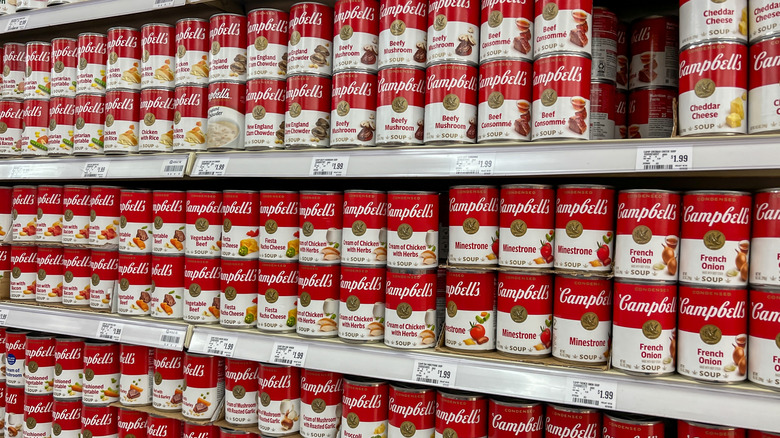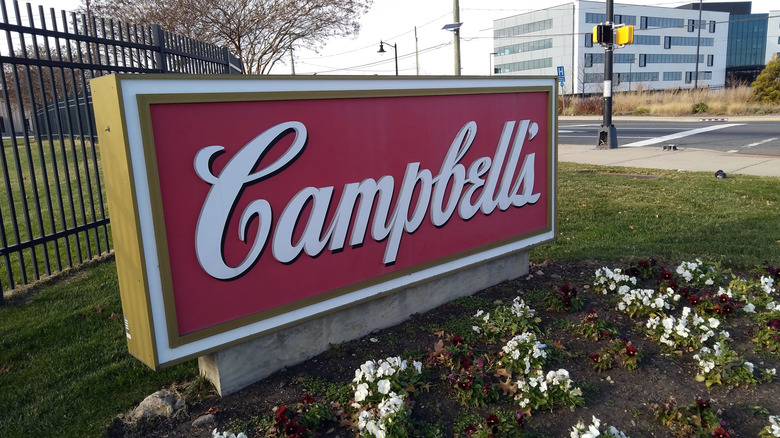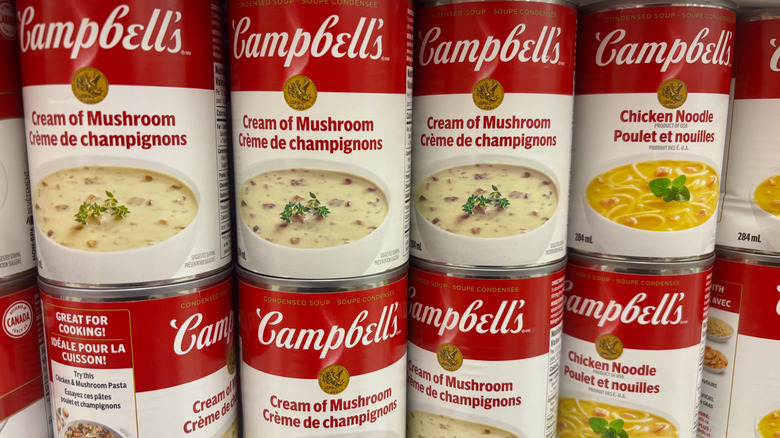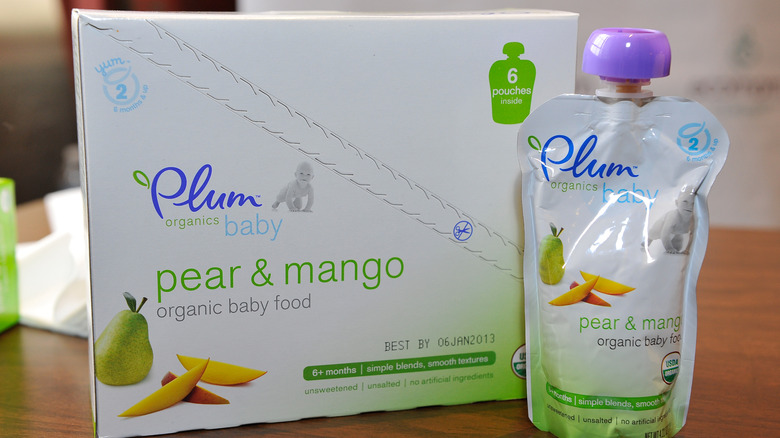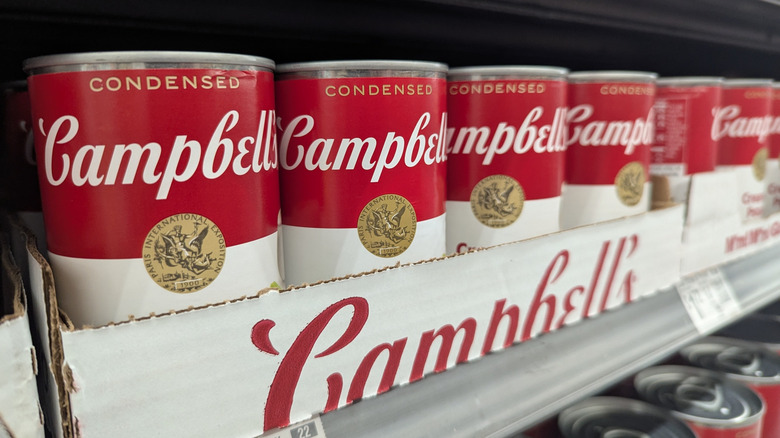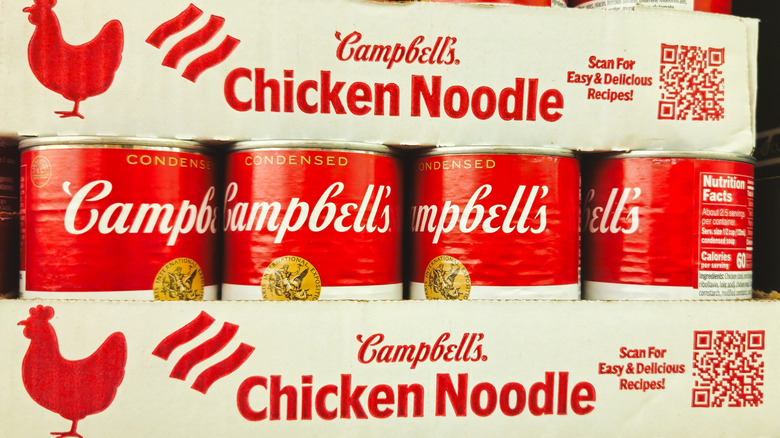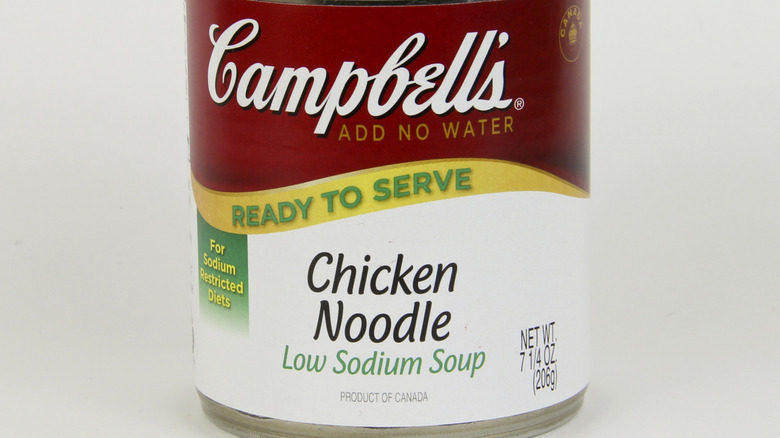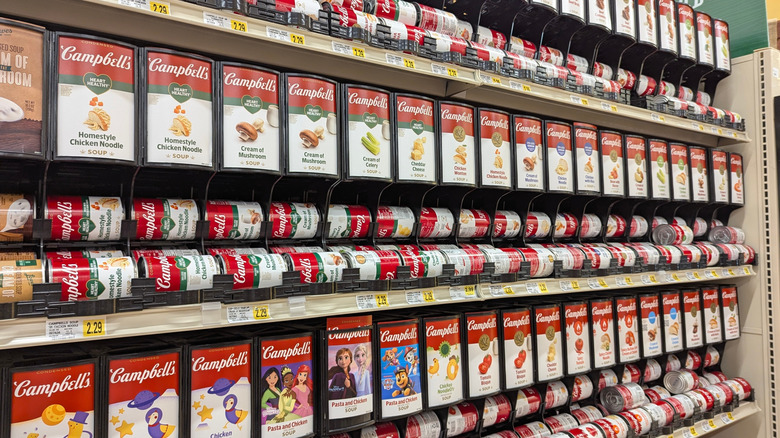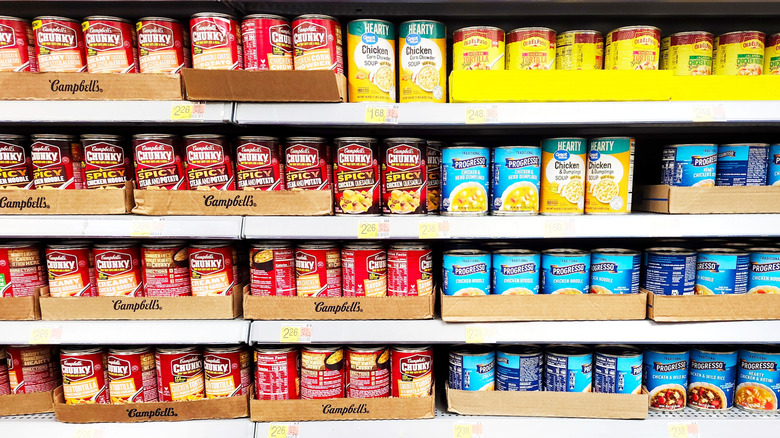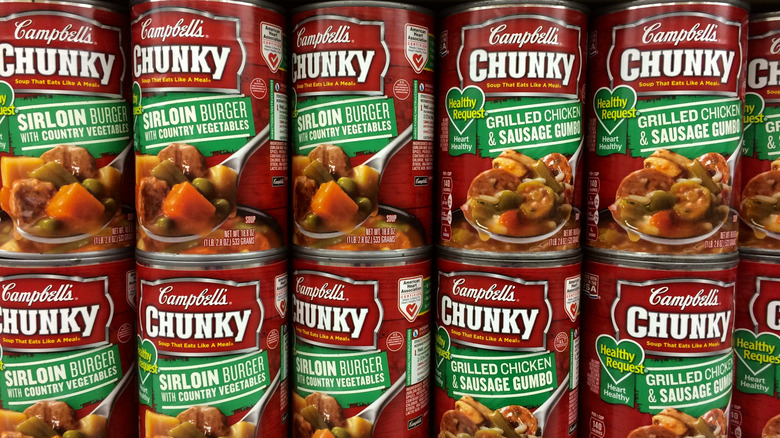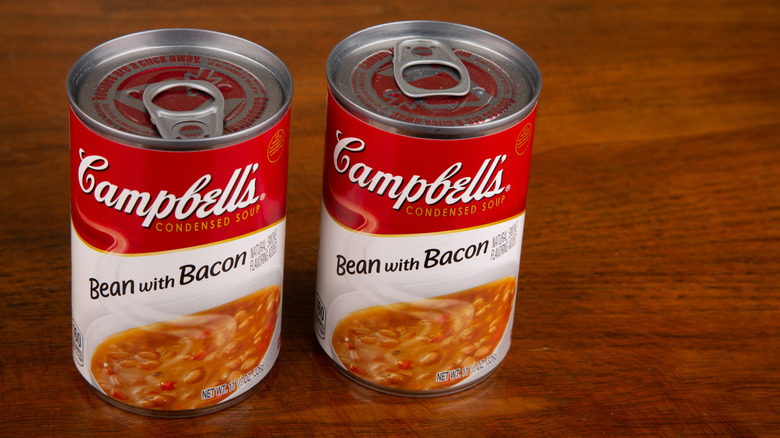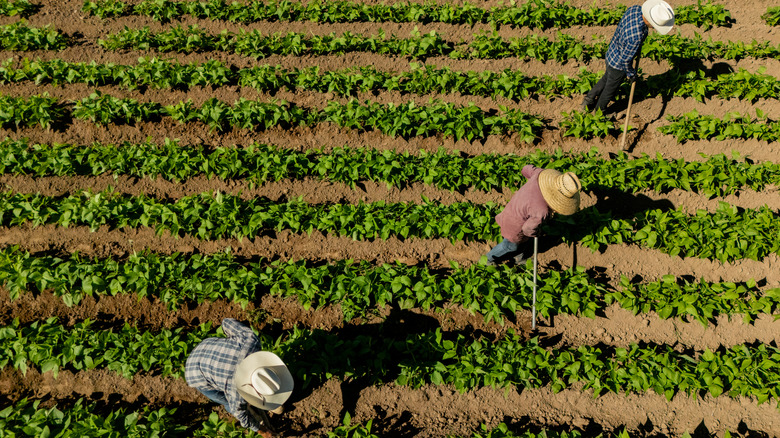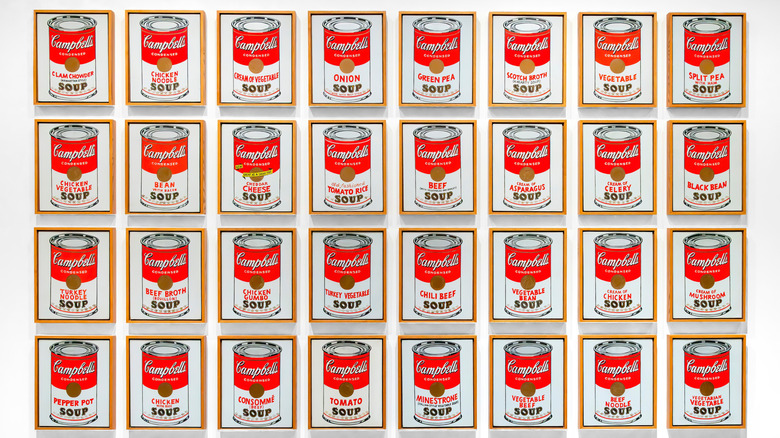14 Campbell's Soup Controversies We Can't Forget About
Campbell's Soup undoubtedly presents a wholesome image. The classic red and white cans inspire a certain nostalgia in those who grew up slurping down noodles from one of the best canned chicken noodle soups when they were sick, or those who fondly remember dipping grilled cheese sandwiches into a bowl of thick tomato soup. Even if you've grown into a home cook who prefers to make your dishes from scratch, you may very well still keep a few cans of Campbell's condensed soups in the pantry because we all know they're a requisite for comfort food favorites like green bean casserole.
However, for all its wholesome goodness, Campbell's — which boasts a long history stretching out over the last 150 years — has had its shady moments, too, including getting wrapped up in food recalls that affected millions. Controversies have mired Campbell's reputation from time to time, but many of these headline-making stories have been long-forgotten by modern consumers. Still, if you strive to choose products with brand behavior in mind, you'll want to brush off the history books and take a look at these top Campbell's Soup controversies.
Campbell's admits to polluting Ohio River, Lake Erie (2025)
Not all Campbell's controversies are a thing of the past. Most recently, Campbell's was the focus of a joint lawsuit filed in 2024 by three environmental agencies, including Environment Ohio, Lake Erie Waterkeeper, and even the U.S. Environmental Protection Agency. The lawsuit claimed that Campbell's was polluting water sources in Ohio by dumping all sorts of nasty materials into the Maumee River, which stretches from Fort Wayne, Indiana, passing through multiple counties before emptying into Lake Erie near Toledo. The lawsuit cited that pollutants such as phosphorus, ammonia, oil, and grease were being dumped into the river at a canning facility in Napoleon, Ohio. Furthermore, the lawsuit said the facility was responsible for introducing E. coli bacteria into the water.
Facing such a lawsuit, Campbell's came out a year after it was filed and admitted that the facility in question had indeed violated the Clean Water Act between 2018 and 2024, with at least 5,400 recorded incidences of polluting the river. However, while Campbell's owned up to its actions, the brand also released a statement claiming that these violations didn't have all that much of a negative impact on the Maumee River. The three environmental agencies anticipate going to trial with Campbell's in 2026.
Campbell's slammed for misleading labels (2025)
Many foods are impacted by tariffs, and another recent Campbell's controversy was tied directly to trade wars between the U.S. and Canada. During the political back-and-forth, Canadian officials were urging their citizens to buy domestically made products. At this time, an Ontario politician claimed that some companies, including Campbell's, were attempting to take advantage of the situation, branding their products as Canadian-made, even though that wasn't the case. The politician further went on to say that Campbell's was putting Canadian flags on its cans, even though the soups had been produced in New Jersey.
Campbell's responded to the accusation, alleging that, at one point, it did brand some of its cans as "Designed in Canada," but that the branding was removed in 2024. The company further pointed out that it still sources ingredients from Canadian farmers and produces some items specifically designed for the Canadian market. This includes broth products, which are made in Canada and branded as such.
Heavy metals found in Campbell's-owned baby food (2021)
Incorrect packaging, exposure to dangerous bacteria, or the presence of foreign materials are all common reasons for food recalls. When some Campbell's products were recalled in 2021, however, it wasn't soup that consumers had to worry about. While metal contamination usually involves shards from a piece of machinery that have accidentally found their way into a sealed product, a U.S. Congressional report found that some baby foods — including items produced by Plum Organics, a brand owned by Campbell's until March 2021 — could contain high levels of heavy metals, including lead, mercury, and arsenic.
The report further noted that Campbell's wasn't exactly cooperating with the investigation into the baby foods. Additionally, before the report's release, Plum Organics' products had been tested between 2017 and 2019, and were proven to contain unsafe levels of heavy metals.
Campbell's went on to issue a statement saying the brand would fully cooperate with the federal investigation, and the soup brand was surprised that the government accused it of not fully cooperating in the first place. The company also implied that the FDA needed to establish better regulations for heavy metals in baby food.
Campbell's exec fired after posting conspiracy theories (2018)
Not every conspiracy in Campbell's history revolves around the brand's products. In other instances, it's simply a higher-up who causes a stir. This was the case in 2018, when Campbell's executive vice president, Kelly Johnston, left the company after posting conspiracy theories on X, which was known as Twitter at the time.
Johnston essentially claimed that George Soros, financier and philanthropist, and his Open Society Foundations were ferrying migrant caravans into the U.S. and providing migrants with immigration lawyers. Although this was hardly the first time Soros and Open Society Foundations had been embroiled in accusations, they refuted the claim and brought Campbell's into the argument. The soup brand quickly released a statement, saying that Johnston's views did not reflect the company and that he would be removed from his position. Within a matter of days after posting the conspiracy theory, Johnston was already out of Campbell's.
Campbell's cans test positive for BPA (2012)
You probably know BPA mostly because you see products labeled as "BPA-free," but what exactly is it, and how did it cause a Campbell's controversy? BPA is a chemical found in plastics often used for food packaging or containers. However, the chemical can potentially leech into food or liquids and cause health issues, like cardiovascular disease, diabetes, or cancer. The FDA, though, holds that the low levels of BPA found in some foods are safe. Still, it made headlines when Campbell's cans tested positive for BPA in 2012, especially because other companies had already expressed their intention to phase out the use of the chemical. Some countries had even prohibited it by this point.
In response, the same year, Campbell's said it would try to move away from using BPA. However, it would take until 2017 for Campbell's to fully transition away from using it in can linings, swapping out the chemical (which can keep cans from leaking) with acrylic or polyester. The company said the delay was due to the extensive testing needed to find a suitable replacement.
Campbell's adds more salt to its soups (2011)
In 2011, Campbell's reported that it was seeing lower-than-desirable sales and, as a result, had to make some changes. The brand's best idea? Improve the flavor of its products by increasing the amount of salt. The change specifically impacted its Select Harvest soups, bumping up the amount of sodium per serving from 480 milligrams to 650 milligrams. (The American Heart Association recommends adults consume no more than 1,500 milligrams of sodium per day, so if you were to eat even just one serving of these Select Harvest soups — and most cans of soup contain more than a single serving — you'd be well on your way to meeting your cut-off for the day.)
The decision drew attention from health and consumer-focused organizations, including the Center for Science in the Public Interest, which asked why, if the company wanted to improve flavor, it didn't just use better-quality ingredients. The center answered its own question, claiming that Campbell's decision was one fully based on profits.
Campbell's uses misleading labels (2010)
In 2011, Campbell's was once again accused of printing misleading information on its packaging. A 2010 news investigation found that some cans of Campbell's soup were marketed as low-sodium, but when compared to the regular versions, the sodium content was the same. Additionally, some of the soups advertised as low-fat actually had more grams of fat than their standard equivalents. These low-sodium and low-fat soups were being sold at a higher price.
When Campbell's was asked about the issue, the brand clarified that the packaging wasn't comparing the low-sodium tomato soup to the regular. Instead, the low-sodium tomato soup was lower in sodium on average than all varieties of Campbell's condensed soups. It also noted that the low-fat soups had added fat to improve flavor. Campbell's stated that the so-called "healthier" cans were more expensive simply because the ingredients were different and weren't made in as large a quantity.
Consumers angry over Campbell's halal line of soups (2010)
In 2010, some consumers began boycotting Campbell's after the brand released a line of halal-certified soups. The products were only available in Canada and were designed with a label declaring their halal certification. The soups came under fire, however, after an influential blogger wrote about them. She noted that she wasn't bothered that Campbell's put out halal-certified soups. Rather, she was upset that the certification came from the Islamic Society of North America, which had previously been tied to Hamas and the Muslim Brotherhood.
However, while government prosecutors said that the Islamic Society of North America had potentially funded Hamas to a degree, the society denied this connection. While the boycott was ongoing, Campbell's also said that it had investigated the organization and found nothing amiss. The boycott may have worked to some degree, though, because the Canadian leg of Campbell's currently offers only two halal products on its website. The other products previously included in the line seem to have become discontinued Campbell's soups.
Campbell's gets into soup war with Progresso (2009)
We've all watched brands get into friendly competitions, particularly on social media, with fast food giants tossing insults back and forth to the glee of online spectators. However, in 2009, Campbell's took its war with competitor Progresso a little further than some thought tasteful. Rather than post a few comments on Twitter or Instagram, Campbell's launched a full-on advertising campaign against Progresso. Ads featured people eating both brands' soups, then claiming that Campbell's products contained fresh ingredients, while Progresso's soups contained MSG: an ingredient long inappropriately maligned.
Progresso responded to the campaign, saying it was in the process of removing the MSG from its products. Then, it launched its own marketing rebuttal reporting that some of Campbell's soups also contained MSG. While Campbell's initial advertising campaign somewhat worked and the company's sales went up, the soup brand switched tactics after a short while, dropping any mention of competitors.
Campbell's criticized for acknowledging LGBTQ couples (2008)
In 2008, the American Family Association began criticizing Campbell's for running advertisements in publications geared toward the LGBTQ+ community, such as Advocate magazine. The ads showed same-sex couples in traditional family settings. The AFA claimed that this recognition supported a homosexual agenda and recognized LGBTQ+ parents as legitimate — something the association did not support. The organization demanded Campbell's discontinue the ads, but the soup company declined and maintained the marketing, stating the importance of inclusion and diversity. This was a significant move for the company, since Campbell's had traditionally avoided taking any political or social stances.
The 2008 incident was not the only time the AFA went after specific brands. In 1989, the organization called for a boycott of PepsiCo products after the brand signed an advertising contract with Madonna, citing the pop star's use of sexual imagery and religious icons in her work.
Campbell's ads accused of deception (1989)
Watching out for deceptive marketing is one of the Federal Trade Commission's primary roles, and the organization has held many food brands responsible. In 1989, the Center for Science in the Public Interest asked the FTC to investigate certain health benefits Campbell's claimed in its products. Upon inspection, the FTC declared the brand guilty of misleading consumers through false advertising. The ads in question implied that eating some of Campbell's soups boasted nutritional benefits, including reducing one's risk of certain types of heart disease. Even though the soups were low in fat and cholesterol, they were still high in sodium, which can raise blood pressure and add stress to the cardiovascular system when consumed in excess.
In response, Campbell's stopped running the accused ads. However, the company also claimed innocence, and a spokesperson noted that the sodium content of each soup was listed right on the can. The brand's response possibly implied that it was up to the consumer to check whether a soup was legitimately heart-healthy.
Campbell's oversells health benefits (1987)
Just a couple of years earlier, in 1987, Campbell's was again found to be overselling the health benefits of its soups. The brand had released an advertising campaign highlighting the fiber content of its bean and pea soups. In its marketing, Campbell's mentioned the National Cancer Institute and that eating a high-fiber diet could help reduce the risk of cancer. However, after review, the National Cancer Institute asked the brand to remove all mention of the organization from its advertisements. While the soup contained fiber, the Institute also noted the soups contained quite a lot of salt, to the extent that the organization did not want to be associated with the products.
In turn, Campbell's noted that those looking to reduce cancer –– particularly colon cancer –– wouldn't be worried about sodium. Keep in mind that, in 1987, the National Academy of Sciences recommended adults consume no more than 3,300 milligrams of sodium per day. (Today, that figure is at a daily maximum of 2,300 milligrams.) As such, Campbell's said that a serving of the soups in question fit right within federal sodium guidelines. The brand admitted, though, that each can contained up to three servings of the soup, and many individuals would eat the entire can in one sitting. Ultimately, Campbell's removed any mention of the NCI in its ads.
Campbell's Soup farmworkers strike (1978 - 1986)
In 1978, the Farm Labor Organizing Committee (FLOC) –– an organization founded to protect the rights of agricultural workers –– approached Campbell's Soup Company about the poor working conditions of farmworkers who picked the brand's vegetables. The FLOC had found that these workers were living below the poverty level, did not have insurance, and were given unreasonable housing by their employers.
When Campbell's failed to respond, more than 2,000 workers decided to strike, demanding minimum wage, plumbing in their living quarters, worksite toilets, and the cessation of spraying pesticides while they were in the fields. Campbell's denied responsibility. The next year, the organization called for a Campbell's boycott. Then, in 1983, the FLOC gathered workers and community members for a march from Toledo, Ohio, to Campbell's headquarters in New Jersey, with rallies along the way. At the headquarters, the strikers protested before presenting a petition. Finally, in 1986, Campbell's relented and signed a contract, recognizing the agricultural workers' union and providing a minimum wage and benefits.
Campbell's considers suing Andy Warhol (1962)
When Andy Warhol painted his famous Campbell's Soup can paintings, it wasn't like the company was commissioning him. As such, when he debuted the artwork in 1962, Campbell's responded with a lawyer and a potential cease and desist. However, a new chairman at the company waved off any legal action for the time being. For one, the chairman was an art fan. Also, the paintings were being heavily criticized, and no one (potentially not even Campbell's) thought of them as real art.
Two years later, however, the company reached out to Warhol, ready to partner up. Campbell's sent Warhol some of his favorite tomato soup. The brand commissioned a painting from him for a retiring executive. It also held a promotion wherein consumers could mail their Campbell's Soup can labels and a dollar to be entered to win a Warhol paper dress.
Still, Campbell's wasn't quite enough of a fan to buy Warhol's "Can with Peeling Label" when the piece went to auction, even though the auction house offered the brand first dibs. The artwork was later sold for $60,000.Eventually, though, the company must've come around, because it released a 2012 series of limited-edition cans inspired by Warhol's artwork.
